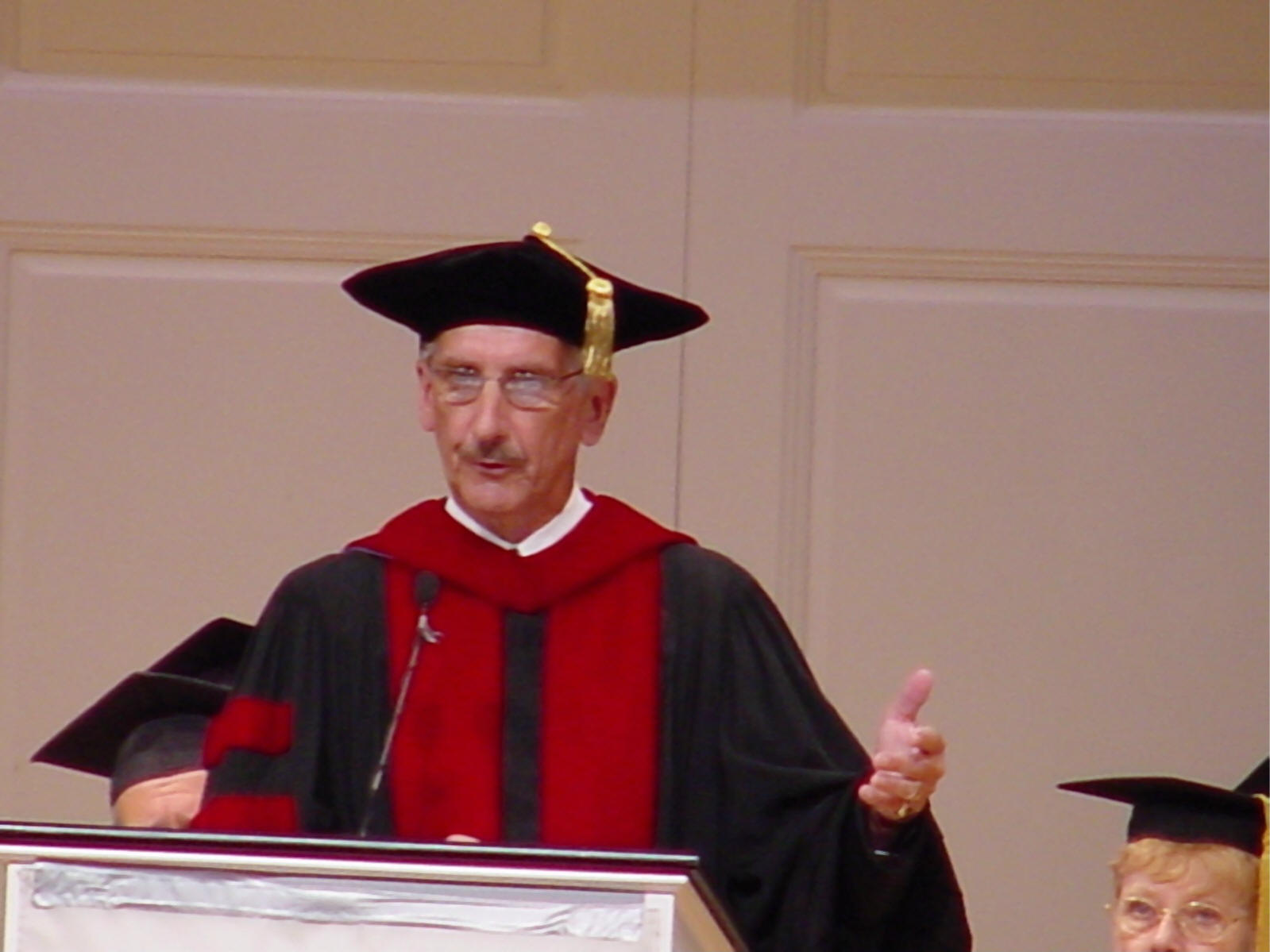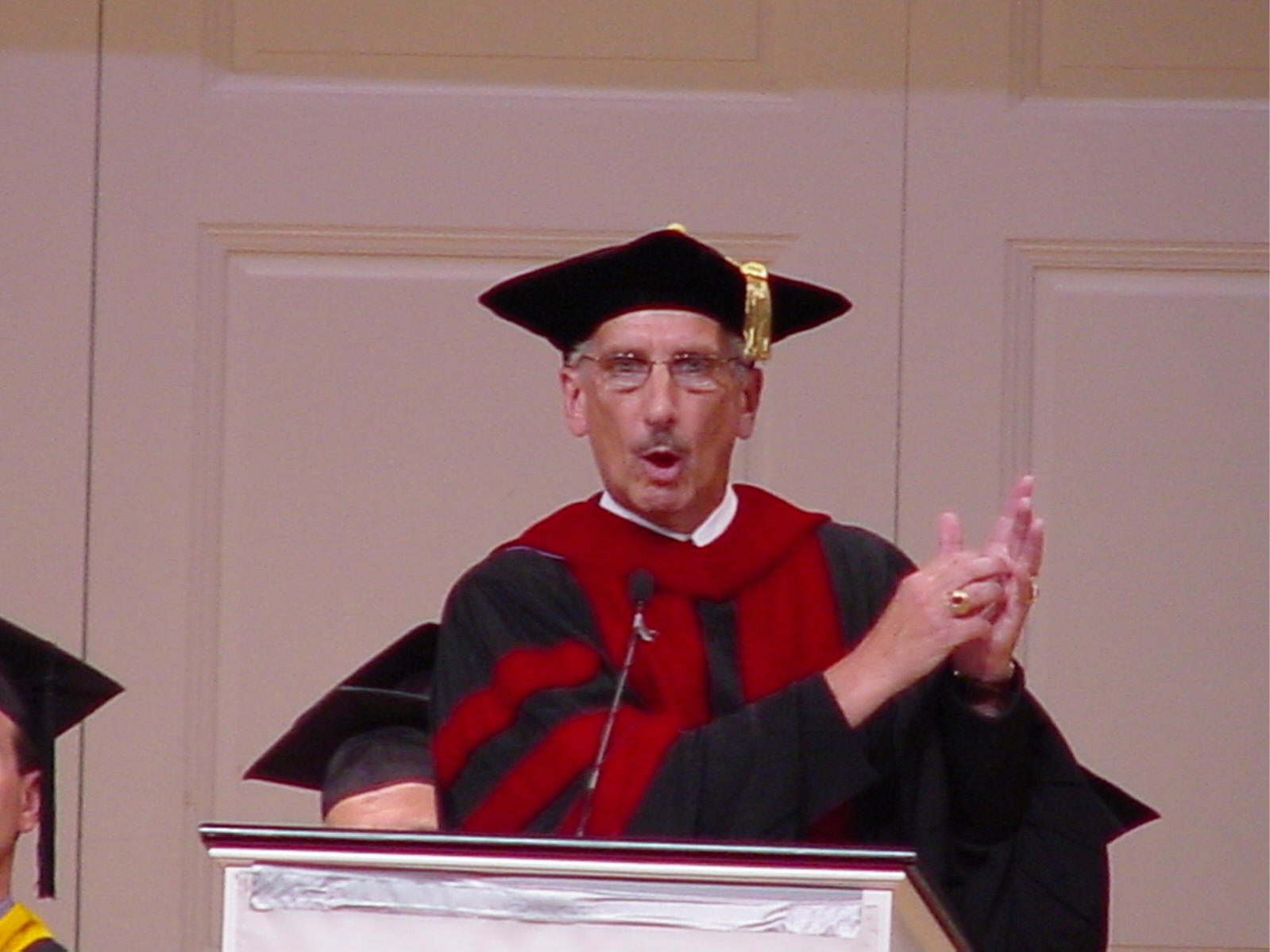|
I stand before you-those that I have had and those that I haven't had in class filled with anxiety and angst. I want to be sure that my former students leave the hallowed halls of DeVry and remember all that I taught them-especially the material from Life 101. In addition, what about the rest of the graduating class who are about to leave without ever having taken Life 101? Then there is rest of the audience, your family and friends, who also I haven't had in this critical class. It is an awesome challenge to remind my former students and get the rest of the graduating students and the audience up to speed, because when we all leave here tonight, we will return to life-and I won't ever have the opportunity of lecturing you on Life 101 ever again.
Researchers have done follow-up studies with winners of these mega million jackpots. Do you know what they discovered? Five years after lucking out, 75-80% of those winners were worst off financially then they were before they got lucky. In other words, five years from tonight when I win tonight's drawing for $121 million, I have 75-80% probability of being worse off financially in five years than I am now. Therefore, don't spend your life hoping to luck out, even if you do, the results are often bad. Recall my koan: good is bad and bad is good. If you want to be successful, seize upon the bad in your life for therein lies the means to success. For example, in 1941 a little girl was born in Clarksville, Tennessee. She was poor, black, and in the 40s, Clarksville wasn't the most welcoming place for blacks to live. Her family called her, Skeeter. All went well for her until the summer of Skeeter's fourth year. During that summer in Clarksville, Skeeter contracted double pneumonia, scarlet fever, and polio. Doctors told her that she'd never walk again. Two years later, she walked into her family doctor's office on crutches. As she hobbled into the office on a pair of old wooden crutches, the doctor told her that her feeling sorry for herself wasn't going to help her improve her walking-nice bed-side manner. He told Skeeter that he wanted her to start walking around the high school track everyday. What a pathetic picture that little six year old black girl made stumbling around that track on crutches in Clarksville. However, ten brief years later, at the Melbourne Olympics, she won a bronze medal. Four years later in Rome, she won three gold medals, the first American woman to ever win three gold medals in track and field. They said that when Wilma Rudolph ran, no one blinked less they missed seeing her. In her time, Wilma Rudolph was the fastest woman in the world. Why? Not because she lucked out and won life's lotto. Skeeter's success came from bad luck not good luck. Take away the crippling effects of polio; do you think that the world would have ever heard of Wilma Rudolph? She would have grown up, gotten married, had a couple kids, grown old and died. However, we know her because she took the bad and converted into good. Another Southern born woman, who was born a half century earlier than Wilma Rudolph, contracted "brain fever" as a toddler. The high fever destroyed many neurons inside her brain leaving her deaf, blind, and unable to talk.
However, if Helen Keller had lucked out and missed contracting brain fever, what would have happened to her? She would have grown up, married, become a grandmother, and died virtually unnoticed outside her family and friends. Having not lucked out, she used the bad and converted into good. And the list goes on and on of successful people, who didn't luck out in life and because of it, became great people. And you are no different. Good is bad and bad is good. Don't forget this koan; it will be on the test of life...I guarantee you. The question that you should be asking yourself is how did those successful people turn tragedy into triumph? They embraced the pain whether it was polio, brain fever, or whatever. Wilma and Helen are paradigms for each of us. Look for the pain that you experience in life. Name it. Make friends with it. It can be your very best friend if you plan to be successful in life. Pain is after all, the genesis for your greatness-if it is embraced and used. Now, you can attempt to avoid pain and pretend that it isn't there. You can also mask it with alcohol or drugs, which merely makes the pain more debilitating. Here is your homework assignment: spend some time this weekend looking at the major pain in your life and whole-heartedly embrace it for it can be your ticket to success. Your pain may be racism or sexism. Or your pain could be fear of the future or regrets about the past. Your pain could be negativity about your self-worth collected over time or your doubts about your intellectual ability. Your pain could be interpersonal or relational. It could be financial or career-related. It matters not. Grab it by its neck and hang on to it. Don't let it go. Make it motivate you to succeed. In the final analysis, you have no other choice than to do as I am telling you, because if you don't, your problem will attack and devour you. Strike now; don't delay any longer. Here is a 4-step plan to turn your bad into good:
Now, I know that some of you are silently "yes, butting me". "Yeah, you are right Campbell, but in my situation, I can't do what you are suggesting. You just don't know what I'm going through in my life...." And you are partly correct, I don't know what you are going through, but it doesn't matter! If a black polio victim and a white brain fever victim can succeed and become world-class people, you have no excuse. The greater the pain, the greater will be your success. Lastly, my second koan is also something that will surely be on the test of life. My second koan is a paraphrase of mine of something Henry Ford said. My second koan is "You can believe you can or you can believe you can't, either way you will be correct." The truth about your success isn't written in the stars out there. Your success is being written within your head as I speak. You will become what you think you will become. When you leave here tonight, return to the world, and ace the test of life. And you will----if you remember my two koans: "Good is bad and bad is good." And "You can believe you can or you can believe you can't, either way you will be correct." For pictures of DeVry's graduation, click on https://wolverton-mountain.com/collegeclass/devry/MiscGallery/graduation_june_2004/photo_gallery_grad.htm |







 As I look out upon the most honored guests, DeVry's June 2004 graduates, I recognize only a small number of you who have been my students. For the majority who I haven't had, I teach at Tinley Park and at Merrillville where I have taught psych, soc, and a number of humanities courses.
As I look out upon the most honored guests, DeVry's June 2004 graduates, I recognize only a small number of you who have been my students. For the majority who I haven't had, I teach at Tinley Park and at Merrillville where I have taught psych, soc, and a number of humanities courses.
 Therefore, let us not delay. All in this auditorium are going to take a really accelerated version of Life 101. First of you, you will need to learn what KOANS are. A Zen Buddhist master would present his students with a koan with the hope that the koan would bring enlightenment. Koans are questions or statements that are designed to send a shock to ones thinking process thus creating enlightenment. We all know a koan: if a tree falls in the forest and no one is there, does it make a sound?
Therefore, let us not delay. All in this auditorium are going to take a really accelerated version of Life 101. First of you, you will need to learn what KOANS are. A Zen Buddhist master would present his students with a koan with the hope that the koan would bring enlightenment. Koans are questions or statements that are designed to send a shock to ones thinking process thus creating enlightenment. We all know a koan: if a tree falls in the forest and no one is there, does it make a sound?  Nevertheless, Helen Keller graduated at the top of her Radcliffe College class in the exact year that she should have graduated based upon her birth date. Helen Keller's graduation took place precisely 100-years ago this very month.
Nevertheless, Helen Keller graduated at the top of her Radcliffe College class in the exact year that she should have graduated based upon her birth date. Helen Keller's graduation took place precisely 100-years ago this very month.